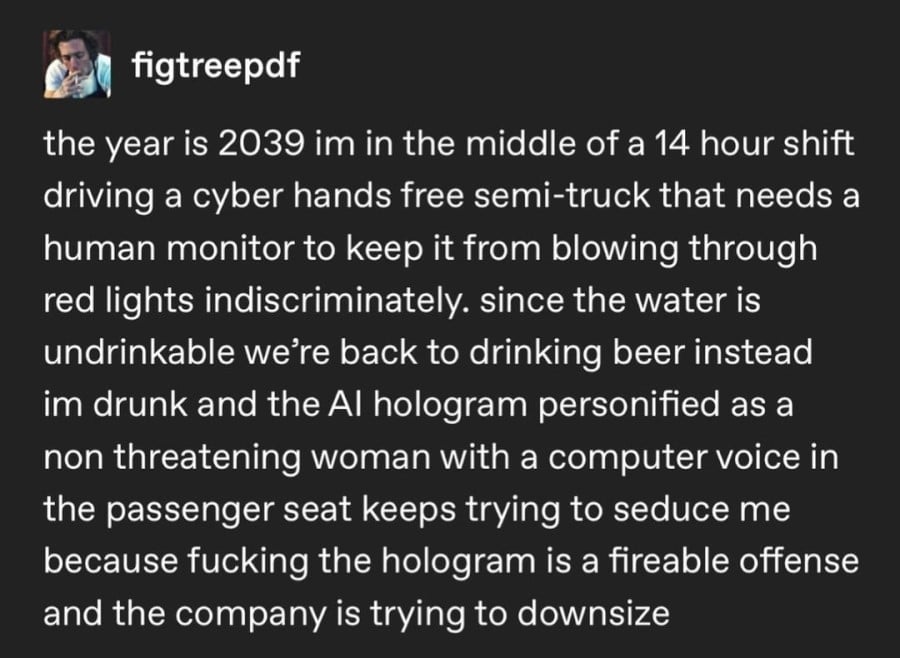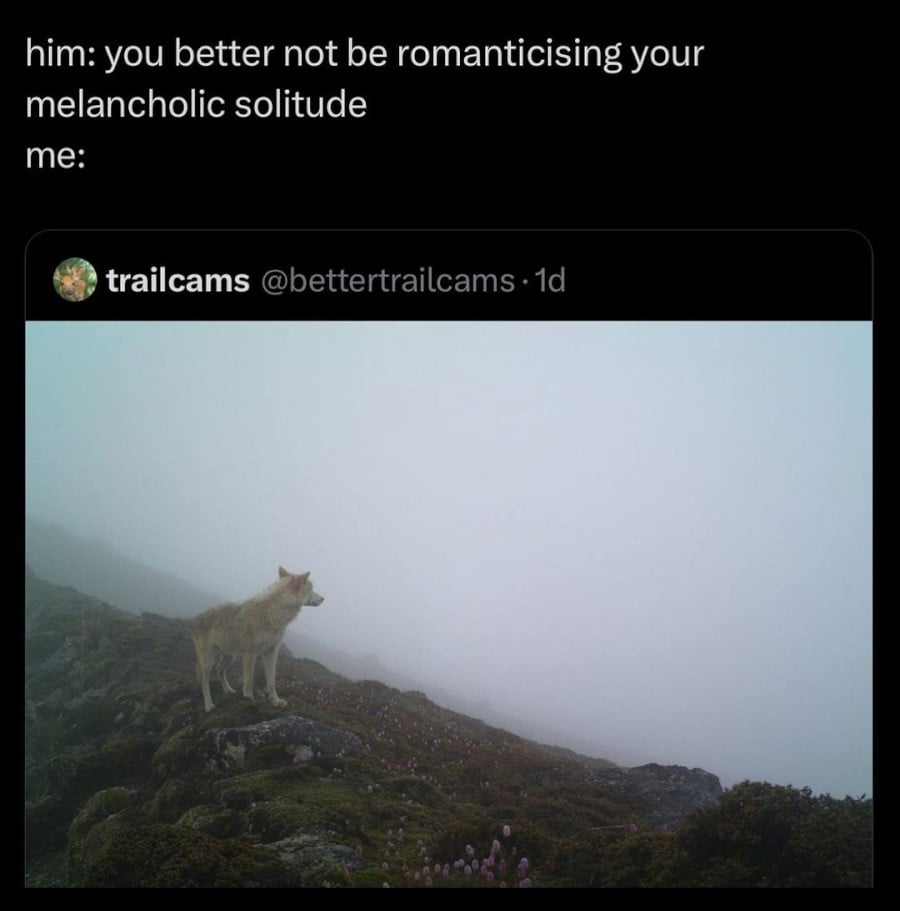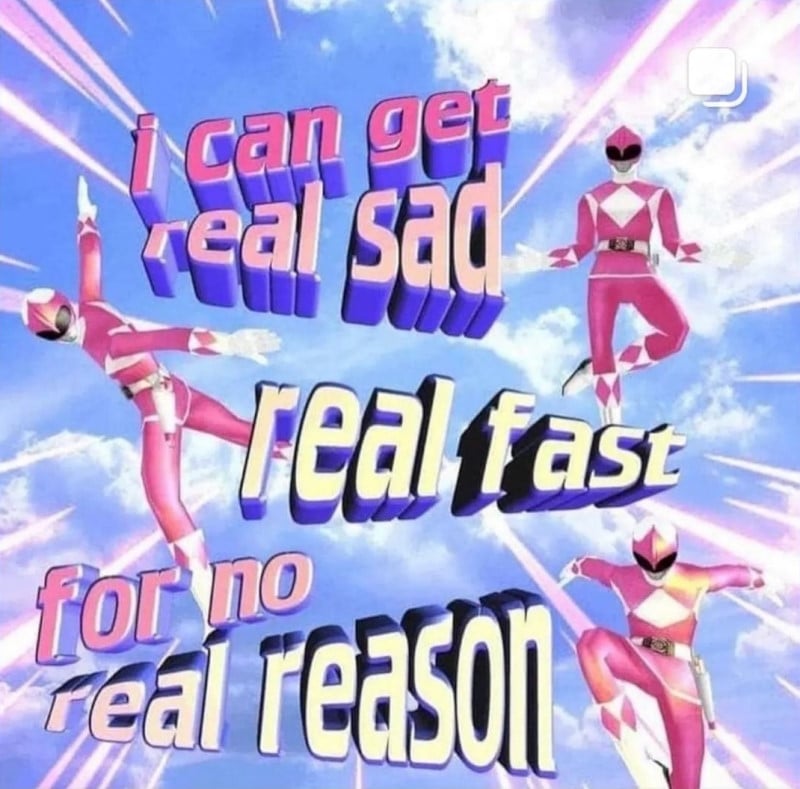nothing here but a moral case for shitposting - issue 235 - 15th October, 2023
nothing here but a moral case for shitposting
issue 235 - 15th October, 2023
CJW: What a week. Let's get right to it, shall we?
We really appreciate all the support we receive from our beautiful readers. If you'd like to help us out, you’ve got a couple of options:
Both give you access to the full bonus archive, as well as new bonuses as they are posted. You can also help spread the word by forwarding this email to someone you think might enjoy it.
The Team
Daniel Harvey (DCH) - Designer, writer, provocateur. Pro-guillotine tech critic. @dancharvey
Marlee Jane Ward (MJW) - is also Mia Walsch. Writer & visual artist. Bleak girl, middle-aged goth aunt.
Corey J. White (CJW) - Author, sin-eater, future sweetie-pie.
Lidia Zuin (LZ) - Journalist, MA in semiotics, and PhD in Arts. Sci-fi writer, futurology researcher and essayist. @lidiazuin
Climate Change & The Environment
CJW: 2023 on track to be hottest year as September shatters heat records - CNN (via Foreign Exchanges)
September felt more like an abnormally hot July with an average global air temperature of 16.38 degrees Celsius (61.45 Fahrenheit), making the month 0.93 degrees Celsius hotter than the 1991 to 2020 average, and 1.75 degrees Celsius hotter than the September average for the pre-industrial era, before the world started burning large amounts of fossil fuels.
That’s well above the 1.5 degrees Celsius threshold to which countries aim to limit global warming under the Paris Climate Agreement. While that agreement focuses on longterm average temperatures, September’s abnormal heat – which followed the hottest summer ever recorded – has given a preview of what the world can expect as soaring temperatures supercharge extreme weather.
I mentioned a little while ago that 1.5 degrees above pre-industrial levels was probably already baked in (when taking the lack of substantive change into account), and I'm not happy being right. Obviously we’ll see fluctuations, and worse years and better years, but the heat we’ve seen this year does not bode well.
//
“Will highly evolved microbes really deliver us from the plastic crisis? Some scientists think the technology will remain limited. A recent critical review in the journal Nature noted that many kinds of plastics would probably never be efficiently enzymatically digested, because of the comparatively huge amount of energy required to break their chemical bonds. Andy Pickford, the professor at Portsmouth, is familiar with the limitations, but thinks many good targets still exist. “Nylon is tough but doable,” he says. “Polyurethanes, also doable.” The scientists at Carbios agree, predicting that they will have a process to recycle nylon within a few years. If those predictions come to pass, about a quarter of all plastics would become truly recyclable; if there turns out to be an enzyme match for all the plastics that are theoretically susceptible to being broken down, just under half of all plastic waste could be on the table.” ‘We are just getting started’: the plastic-eating bacteria that could change the world by Stephen Buranyi at The Guardian
"With little fanfare, the European Union has launched a huge climate experiment. On October 1, the EU kicked off the initial phase of a Europe-wide tax on carbon in imported goods. This marks the first time a carbon border tax has been tried at this scale anywhere in the world. Europe’s experiment could have ripple effects across the entire globe, pushing high-emitting industries to clean up their production and incentivizing other countries to launch their own carbon taxes. It may well end up being the most important climate policy you have never heard of." - The EU Just Kicked Off Its Biggest Climate Experiment Yet - Matt Reynolds at Wired
The Bold Idea To Move Millions To Climate Havens by Justin H. Vassallo at Noema
Just the headlines:
The ozone hole above Antarctica has grown to three times the size of Brazil by Stefanie Waldek at Space.com
Geopolitics & Empire
CJW: Azerbaijan eyes Iran, Armenia borderlands after 'voluntary' exodus from Nagorno-Karabakh - Amberin Zaman at Al Monitor (via Foreign Exchanges)
The convoys snaked for miles along mountain passes as the mass exodus of Armenians from Nagorno-Karabakh, a majority Armenian enclave that is formally part of Azerbaijan, continued to unfold. Western leaders wrung their hands but did nothing to stop it. With the few belongings they could retrieve — mattresses, refrigerators, pots and pans — piled precariously on their battered Soviet-era cars, over 100,000 people, almost triple the population of Lichtenstein, fled the contested region where Armenians dwelled for millennia until Azerbaijan first starved them under a nine-month-long blockade then attacked them on Sept. 19 in what it called an “anti-terror operation.”
The effective ethnic cleansing of an entire population in less than two weeks marked one of the largest civilian displacements in the South Caucasus since the collapse of the Soviet Union and a geopolitical shift of seismic proportions that empowers Turkey, weakens Iran and puts Armenia’s fledgling democracy at risk. For most Armenians, it was — as Armenian political analyst Tigran Grigoryan put it — “the greatest catastrophe to befall our people since the genocide of the Ottoman Armenians in 1915.” Yet the story has already vanished from international headlines.
A detailed look at the situation in Nagorno-Karabakh and the broader geopolitical context surrounding it. I've put it up top because something else has been dominating headlines this past week…
//
CJW: A bit of a round-up on the current conflict in Israel-Palestine. I'll just open by saying the obvious: there is no justification for violence targeted at civilians. That said, decades of Israeli oppression and violence against Palestinians meant that something like this recent Hamas attack was bound to occur. Condemn Hamas' tactics, but don't forget that under international law Palestinians have a right to armed struggle against Israeli occupation. There is a lot more context here than the mainstream media would like to admit. If you haven’t already educated yourself, the below links cover a lot of ground.
No pull quotes from this first piece, but it's important (as you can tell from the headline): Everyone Should Be Calling for a Cease-Fire in Palestine - Branko Marcetic at Jacobin
The Violence in Palestine and Israel Is the Tragic Fruit of Brutal Oppression - Seraj Assi at Jacobin
The tragic scenes unfolding in Gaza and Israel are a chilling reminder that occupation and oppression bear a price. For the truth is that when you imprison two million people in 140 square miles, placing them under a merciless siege with no end in sight, with no way in or out, with drones and rockets buzzing overhead night and day, with constant surveillance and harassment, with scant control over their day-to-day lives — ultimately, the dispossessed will rebel.
The violence was not unprovoked, as the mainstream media has depicted it. It has been brewing and festering in every corner of the country.
I like to think we do a decent job of covering the plight of Palestinians under Israeli occupation, but this piece summarises events to provide context to the current outbreak of violence.
Biden Doubled Down on Abraham Accords to “Devastating Consequences” - Murtaza Hussain at The Intercept
The new outbreak of intense violence represents a total failure of the Biden administration’s Middle East policy. The administration has centered its regional policy on the expansion of the “Abraham Accords,” a set of diplomatic normalization agreements between Israel and regional Arab countries. It is an effort in which President Joe Biden has sunk much resources and political capital.
The de facto premise behind the accords, initiated under former President Donald Trump and led by his son-in-law Jared Kushner, was to “solve” the Israel–Palestine conflict by simply ignoring the Palestinians and treating their conditions as irrelevant. This weekend’s events show that this approach, premised on Palestinian invisibility, has now collapsed. Indeed, the expectation that Palestinians would simply resign themselves to a slow death, an assumption evidently carried forth by Biden, was never realistic.
[...]
There have been long warnings that conditions in the Gaza Strip were a ticking time bomb. Gaza’s residents have lived under permanent siege for over a decade and a half, without the prospect of a diplomatic process anywhere on the horizon — let alone a solution. Their desperation had been building for years prior to the present war. Palestinian demonstrators, many of whom had never left Gaza in their lives, have organized several large protest marches toward the Israel-run border fence in recent years. They were met with indiscriminate gunfire from Israeli forces that killed civilians as well as medical personnel — as well as indifference by the international community, which carried on in the aftermath of the killings with business as usual.
In the meantime, the U.S. has sat on the sidelines as diplomatic off-ramps were proposed — and floundered.
This piece contains some context on the recent political failures of US diplomacy regarding Israel-Palestine.
Left Politicians Are Showing How to Respond to the Horrors in Israel and Palestine - Ben Burgis at Jacobin
Israeli prime minister Benjamin Netanyahu has absurdly warned the two million Palestinians in Gaza, over half of whom are children, to leave before the ground forces show up because the Israeli army will be operating at “full force” throughout the territory. Of course, he himself is stopping them from doing that. Gaza is an open air prison camp in all but name. Most of the families that live there are refugees from Israeli ethnic cleansing in other parts of the country, and the Israeli military tightly controls all entrances and exits.
Even more disturbingly, Israel’s defense minister has said:
I have ordered a complete siege on the Gaza Strip. There will be no electricity, no food, no fuel, everything is closed. We are fighting human animals and we act accordingly.
Note the openly genocidal rhetoric of that final sentence.
The rest of this piece is about US domestic politics, so it's relevant for any USians in the audience.
Israel Responds to Hamas Crimes by Ordering Mass War Crimes in Gaza - Alice Speri at The Intercept
This piece picks up from the quote above:
What [Israel's defense minister Yoav] Gallant ordered — the collective punishment of a civilian population — amounts to a war crime under international law, as well as potentially a crime against humanity and the crime of genocide, some international law experts have pointed out. Hamas’s massacre of civilians and taking of at least 150 hostages, whom it has reportedly threatened to execute in response to the targeting of civilians in Gaza, are also war crimes.
Hamas and Israel’s crimes against civilians, which are likely to escalate in the coming days, come after years of impunity for Israel’s crimes against Palestinians. The historical lack of accountability has bred a culture of disregard for international law that directly resulted in the weekend’s violence, human rights advocates say.
And one last piece:
In the West Bank, Israel’s Apartheid Rule Results in Everyday Violence - Carolina S. Pedrazzi at Jacobin
//
The SS, The Holocaust, and Yaroslav Hunka - Samuel Clowes Huneke at Foreign Exchanges
Science & Space
LZ: Using Dairy DNA, Startup Is Making Milk from Mushrooms
At this point, I can only imagine how we can evolve to something like an AI-funghi based being.
//
DCH: Black swans from Mars? The real risks of sending alien samples home by Valerie Brown at thebulletin.org
“Microscopic life tends to be a lot more variable than macroscopic in terms of viability,” Singam says. “That doesn’t get incorporated into planetary protection strategies. My take is you’re underestimating microbes. They are the wild cards … they’re always going to surprise you in how adaptable they are. They haven’t survived this long by not being flexible.” They reproduce and mutate frequently, she adds, and they’re able to share genes directly by horizontal transfer, which “allows them to adapt as a population over a short period of time.”
Andromeda Strain here we come.
//
A Lab Just 3D-Printed a Neural Network of Living Brain Cells - Celia Ford at Wired - CJW: One step closer to the realisation of smart gels/head cheese from Peter Watts' Rifters books.
Insect Brains Melt and Rewire During Metamorphosis - Yasemin Saplakoglu at Quanta Magazine
What Do We Owe the Octopus? - Emily Mullen at Wired - CJW: I highly recommend Other Minds by Peter Godfrey-Smith for more on octopus intelligence and likely sentience.
Just the headlines:
Why the first-ever space junk fine is such a big deal by Jonathan O'Callaghan at MIT Technology Review
Tech & Design
DCH: The Moral Case for No Longer Engaging With Elon Musk’s X by Dave Lee at Bloomberg
X is now an app that forcibly puts abhorrent content into users’ feeds and then rewards financially the people who were the most successful in producing it, egging them on to do it again and again and make it part of their living. Know this: As the scramble for attention increases, the content will need to become more violent, more tragic and more divisive to stand out. More car crashes, high school fights and public humiliation.
The new business model for the outrage economy in 2023 is direct payments to the most vile shitposters and hatemongers.
CJW: Related: How the attacks in Israel are changing Threads - Casey Newton at Platformer (via Jared Shurin)
Users repeatedly expressed surprise over the weekend that X had deteriorated as a real-time news source as much as it has. But Musk has been eliminating the safeguards that once made Twitter at least somewhat reliable as a source of news for months now.
He blew up the old verification system, replacing a hand-picked group of journalists whose identities were confirmed by the company with a hodgepodge of culture warriors paying $8 a month to float to the top of replies. He began paying the culture warriors based on the views they got. He blocked and threatened reporters. He sued activists. He began charging eye-watering rates to access the platform’s API, driving away academic researchers. He stripped headlines off the previews of articles. He promoted the accounts of conspiracy theories and right-wing extremists.
This is a system designed to cause chaos in the information environment, and it is working by design.
//
“In three experiments, participants completed a medical-themed classification task with or without the help of a biased AI system. The biased recommendations by the AI influenced participants' decisions. Moreover, when those participants, assisted by the AI, moved on to perform the task without assistance, they made the same errors as the AI had made during the previous phase. Thus, participants' responses mimicked AI bias even when the AI was no longer making suggestions. These results provide evidence of human inheritance of AI bias.” Humans inherit artificial intelligence biases by Luca Vicente, Helena Matute at Nature
AI, Hardware, and Virtual Reality (via Sentiers) - CJW: A rundown of some recent AI announcements and related extrapolations on where the tech might go and what it might do. It is genuinely interesting to consider, but then I remember that these tools are tied up in the surveillance capitalism milieu and any excitement that was building dissipates.
How Neuralink Keeps Dead Monkey Photos Secret - Dell Cameron and Dhruv Mehrotra at Wired
How a Social Network Fails by Taylor Lorenz at The Atlantic
Inside the final seconds of a deadly Tesla Autopilot crash by Trisha Thadani, Rachel Lerman,Imogen Piper, Faiz Siddiqui, Irfan Uraizee at The Washington Post
The Folly of DALL-E: How 4chan is Abusing Bing’s New Image Model by Tristan Lee at Bellingcat
AI data training companies like Scale AI are hiring poets - Andrew Deck at restofworld (via Sentiers)
Just the headlines:
Chatbot Hallucinations Are Poisoning Web Search by Will Knight at WIRED
The Israel-Hamas War Is Drowning X in Disinformation by David Gilbert at WIRED
Society & The Culture
LZ: Better Red Than Dead: Towards A Socialist Black Metal
Quite an interesting piece about the book Tonight It’s A World We Bury by Bill Peel, which explores a range of tendencies central to black metal and uncovers their potential as critiques of capitalism. It does not reclaim BM to be a socialist music genre, but it suggests that if BM has so much hatred to share, then it should be channelling this to the most oppressive force of these days: capitalism.
//
“Biennial testing through NAEP consistently shows that two thirds of U.S. children are unable to read with proficiency. An astounding 40 percent are essentially nonreaders. Most are taught through phonics—a system of instruction based on sounding out letters that is mandated in at least 32 states and the District of Columbia.” Two-Thirds of American Kids Can’t Read Fluently by Marion Blank Scientific American
Videos of 'flash mob' thefts are everywhere, but are the incidents increasing? by Joe Hernandez at NPR
Screw Yourself: VFX Artists Are Bringing 'Clone Porn' to the Mainstream by Samantha Cole 404 Media
Cameras, cops and paranoia: How Amazon’s surveillance network alters L.A. neighborhoods by Lam Thuy Vo Los Angeles Times
Health, Cooking, and Related
DCH: Many of today’s unhealthy foods were brought to you by Big Tobacco by Anahad O'Connor at The Washington Post
“The new research, published in the journal Addiction, focuses on the rise of “hyper-palatable” foods, which contain potent combinations of fat, sodium, sugar and other additives that can drive people to crave and overeat them. The Addiction study found that in the decades when the tobacco giants owned the world’s leading food companies, the foods that they sold were far more likely to be hyper-palatable than similar foods not owned by tobacco companies.”
Turns out we can blame the obesity epidemic in part on the same assholes at RJ Reynolds and their ilk.
//
CJW: The cure for consumerism - Rob Horning
In changing people’s relation to their own appetites, drugs like Ozempic will also affect their social motivations, and what they want in relation to what other people want or have to offer. If personal appetite is eliminated as a use value, consumption will become more a matter of social signification, if that is even possible. (See Baudrillard’s “The Ideological Genesis of Needs,” where he claims use value is a fiction and that “if the system could function without feeding its workers, there would be no bread.”) So perhaps a drug that suppresses appetites will actually make consumerism worse, as no one will have “real” reasons to buy anything but will be shopping and consuming only to have a social identity, unimpeded by “natural” constraints.
This could probably be a pick for the Society & Culture section, but it's also about "wellness," and relates to the piece Dan shared above. On Ozempic and the effects it could have on consumption/consumerism more broadly.
Labour & Economics
CJW: Disney VFX Artists Unanimously Vote to Unionize With IATSE - James Whitbrook at Gizmodo
The VFX industry is a rare area of Hollywood that has historically refrained from unionization efforts, but as strength in labor actions has seen a resurgence in recent years, and there’s been more and more reporting on the unsustainable workloads blockbuster movie studios are putting on increasingly-vital VFX houses, it’s clear that Hollywood is on the precipice of another labor reckoning.
Wanted to include this because a) fuck yes to further labour actions in Hollywood, and b) the premise of my story Hollywood Animals in Interzone #295 is that when the VEX artists all unionise, the studios use genetic engineering technology to create their monsters, aliens, and critters. This is one of a couple of CrispSF stories I wrote, but the only one to be published. Ganzeer wrote about the nascent subgenre recently (thank you for the shout out).
//
“The overall point is that Amazon is degrading the shopping experience, raising prices, and yet somehow still gaining market share. It is able to block third-party sellers from going elsewhere, and therefore also stop potential rivals from gaining share. It’s a fairly strong complaint, and while antitrust cases are always random, Bill Baer, the former Assistant Attorney General for Antitrust under the Obama administration, said it’s a strong argument. “If the FTC and states can prove even some of the factual allegations in this 172 page complaint,” he said, “Amazon is in a world of hurt.”” The FTC Sues to Break Up Amazon Over an Economy-Wide "Hidden Tax" - Matt Stoller at Big
Just the headlines:
Column: The writers’ strike was the first workplace battle between humans and AI. The humans won.
‘Capitalism is dead. Now we have something much worse’: Yanis Varoufakis on extremism, Starmer, and the tyranny of big tech by Carole Cadwalladr at The Guardian (DCH: Economist Yanis Varoufakis has been making the rounds lately in support of his book, Technofeudalism. Worth reading up on him through this and other links. He makes a compelling case that rentier capitalism has eaten everything.
Newsletters
MJW: Shitposting, Shit-mining and Shit-farming by Henry Farrel at Programmable Matter
Some people are quite happy to be kept in the dark, well fertilized with horseshit. And that is the foundation for a business model. Not a rapidly expanding one of the kind that could allow Twitter’s massive debt burden to ever be paid off. But it can keep on producing its cash crop, year in, year out. NoThat, I’m guessing, is where Twitter is likely to end up. Not because Musk planned it that way - he doesn’t seem to have much capacity for that kind of forethought. But because it is the path of least resistance when nothing else seems plausible. Twitter is rapidly decaying. But decay can be turned into money when you have a saprophytic crop.
Podcasts
DCH: Hannah Ritchie on Keeping Hope for the Planet Alive
Environmental researcher Hannah Ritchie joins Sean Carrol on his podcast to discuss the importance of angry optimism. A topic we’re big boosters of around here.
//
MJW: Maintenance Phase just released an episide about Ozempic that is a great look at the short history of semaglutide.
Video
MJW: Just because the world is so depressing, here is Noel Fielding performing the Wuthering Heights dance. I particularly enjoy the earnestness of the performance. You can tell he took learning the dance extremely seriously.
Music
Great quality, raw black metal with inspiration on North American indigenous culture.
The Self-Promotion
CJW: Comp copy of THE BIG BOOK OF CYBERPUNK arrived, and what a sight to behold it is - Ganzeer

Here’s Ganzeer showing off some photos of The Big Book of Cyberpunk. He also talked about the creation of his story here (same link as above about CrispSF etc).
And here is the first review of the anthology - yes, I’m sharing it in part because I got a mention: The Big Book of Cyberpunk edited by Jared Shurin - Adam at The Fantasy Inn
It’s quite hard to pick out standout stories in such a large collection, but I thought the stories by Lavanya Lakshminaraya, James Tiptree Jr., Aleš Kot, qntm, Lavie Tidhar, Bruce Bethke, Greg Egan, Paul J. McAuley, Minister Faust, Yun Ko-eun, Arthur Liu, E. Lily Yu, Nancy Kress, Steve Beard, Corey J. White, Erica Satifka, Sam J. Millar, E. J. Swift, Beth Cato, Eileen Gunn, Victor Pelevin, Brandon O’Brien, Rudy Rucker, Nisi Shawl, Bruce Sterling, Janelle Monae/Alaya Dawn Johnson, K. C. Alexander, and Saad Hossein were all really special in their own ways. This anthology really runs the full gamut of emotion, and there’s a lot of stories here that made me think about elements of the world differently.
It’s a special thing to read a book that inspires you to engage with an entire genre or sub-genre. The Big Book of Cyberpunk was to me a revelation, a showcase of what I’ve been missing, a suggestion that maybe I’m a cyberpunk guy now (or have I been all along?). Well worth a read for fans of the genre, those who’ve barely touched upon it and most people in between.
The Memes






You just read issue #235 of Nothing Here. You can also browse the full archives of this newsletter.